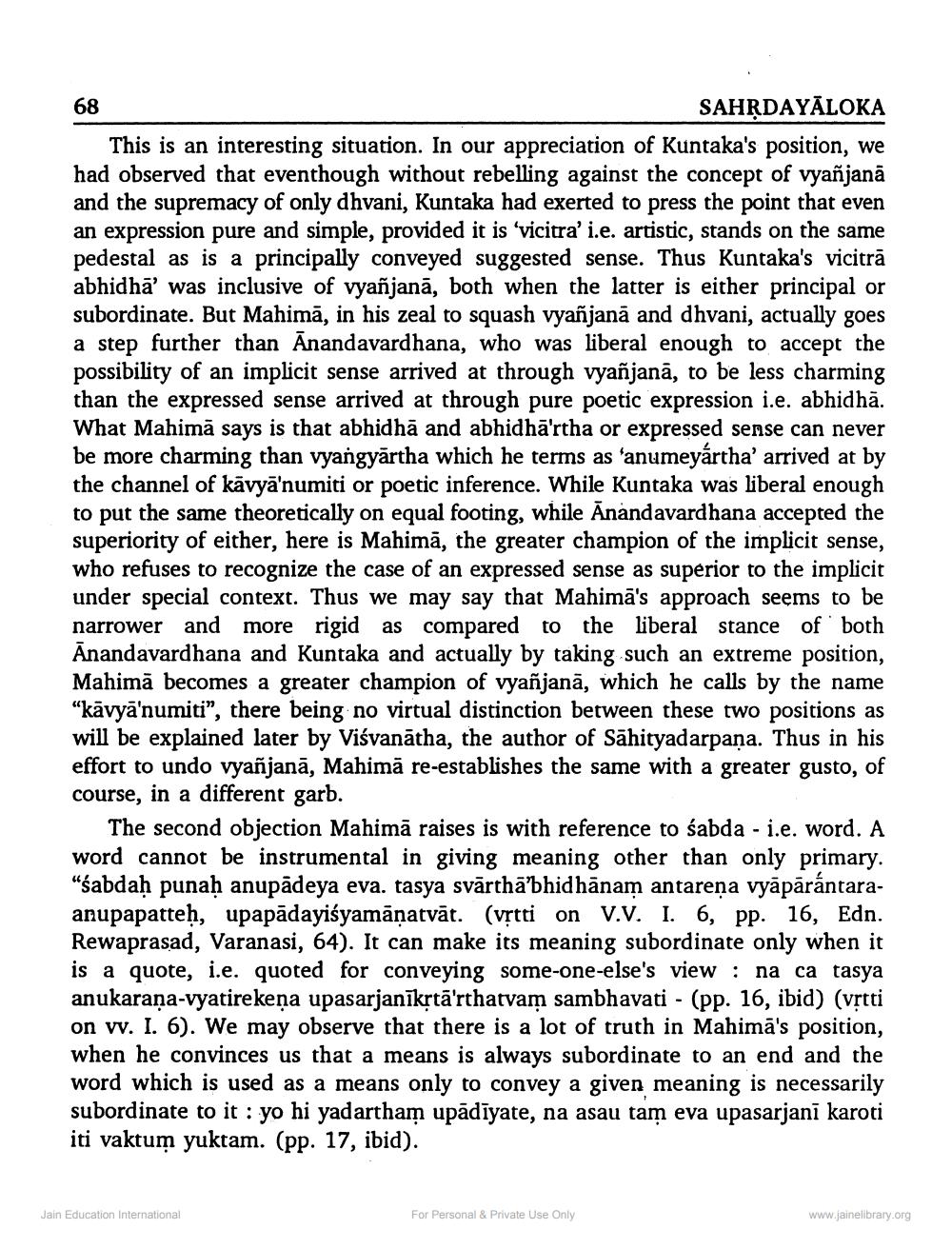________________
68
SAHRDAYĀLOKA This is an interesting situation. In our appreciation of Kuntaka's position, we had observed that eventhough without rebelling against the concept of vyañjanā and the supremacy of only dhvani, Kuntaka had exerted to press the point that even an expression pure and simple, provided it is 'vicitra' i.e. artistic, stands on the same pedestal as is a principally conveyed suggested sense. Thus Kuntaka's vicitrā abhidhā' was inclusive of vyañjanā, both when the latter is either principal or subordinate. But Mahimā, in his zeal to squash vyañjanā and dhvani, actually goes a step further than Anandavardhana, who was liberal enough to accept the possibility of an implicit sense arrived at through vyañjanā, to be less charming than the expressed sense arrived at through pure poetic expression i.e. abhidhā. What Mahimā says is that abhidhā and abhidhā'rtha or expressed sense can never be more charming than vyangyārtha which he terms as 'anumeyártha' arrived at by the channel of kávyā'numiti or poetic inference. While Kuntaka was liberal enough to put the same theoretically on equal footing, while Anandavardhana accepted the superiority of either, here is Mahimā, the greater champion of the implicit sense, who refuses to recognize the case of an expressed sense as superior to the implicit under special context. Thus we may say that Mahima's approach seems to be narrower and more rigid as compared to the liberal stance of both Anandavardhana and Kuntaka and actually by taking such an extreme position, Mahimā becomes a greater champion of vyañjanā, which he calls by the name "kāvyā'numiti", there being no virtual distinction between these two positions as
ill be explained later by Viśvanātha, the author of Sāhityadarpana. Thus in his effort to undo vyañjanā, Mahimā re-establishes the same with a greater gusto, of course, in a different garb.
The second objection Mahimā raises is with reference to sabda - i.e. word. A word cannot be instrumental in giving meaning other than only primary. "sabdaḥ punaḥ anupādeya eva. tasya svārthā’bhidhānam antareņa vyāpārántaraanupapatteḥ, upapādayisyamāṇatvāt. (vrtti on V.V. I. 6, pp. 16, Edn. Rewaprasad, Varanasi, 64). It can make its meaning subordinate only when it is a quote, i.e. quoted for conveying some-one-else's view : na ca tasya anukarana-vyatirekeņa upasarjanīkệtā'rthatvam sambhavati - (pp. 16, ibid) (vrtti on v. I. 6). We may observe that there is a lot of truth in Mahimā's position, when he convinces us that a means is always subordinate to an end and the word which is used as a means only to convey a given meaning is necessarily subordinate to it : yo hi yadartham upādīyate, na asau tam eva upasarjanī karoti iti vaktum yuktam. (pp. 17, ibid).
Jain Education International
For Personal & Private Use Only
www.jainelibrary.org




